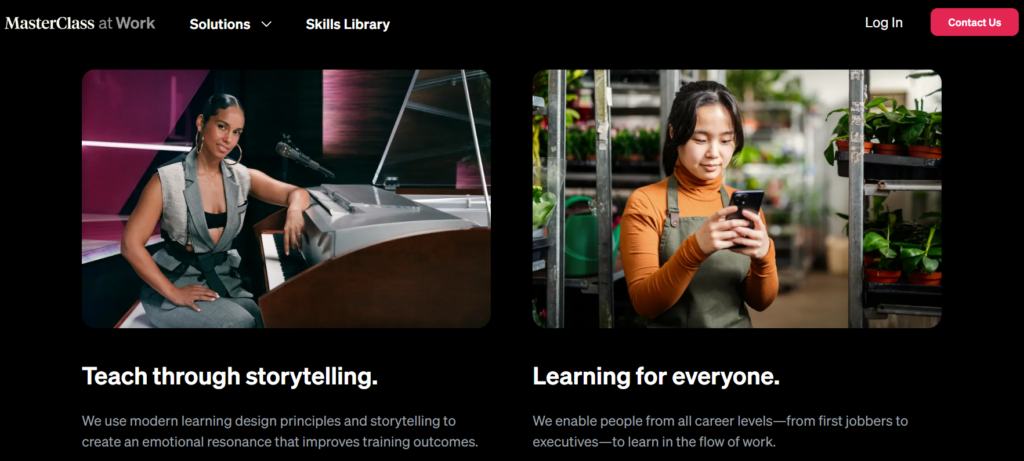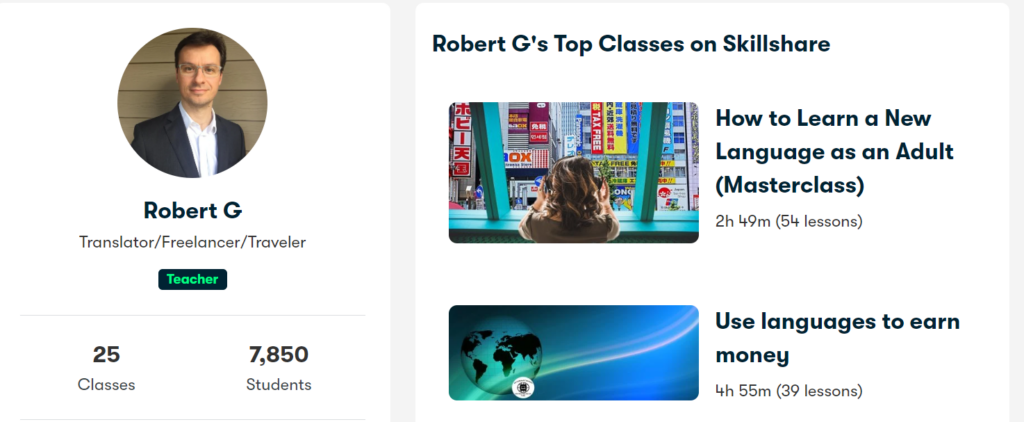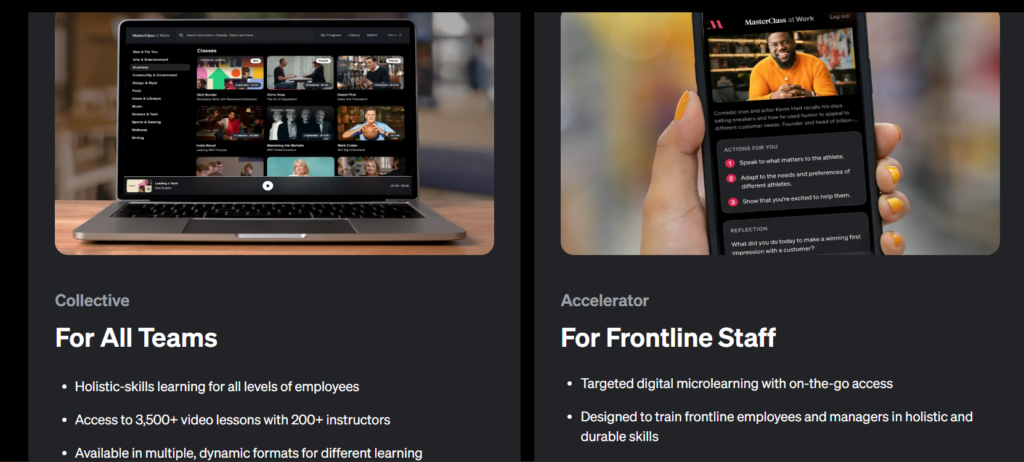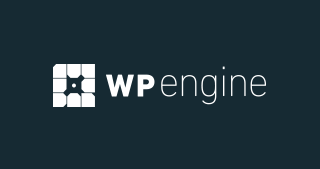Skillshare and MasterClass are two leading platforms in the online education space, each offering unique approaches to learning. Skillshare is a community-driven platform that emphasizes creativity and practical skills, with a wide range of courses spanning design, photography, writing, business, technology, and more. Its project-based learning model encourages users to actively engage with the material, complete hands-on assignments, and share their work with peers.
With an open marketplace for instructors, Skillshare offers courses from a diverse group of creators, making it accessible to anyone who wants to teach or learn a new skill.
On the other hand, MasterClass provides a premium learning experience, known for its exclusive roster of celebrity instructors who are at the pinnacle of their respective fields. From famous chefs like Gordon Ramsay to celebrated writers like Margaret Atwood, MasterClass delivers a curated selection of high-quality courses that offer learners deep insights into the thought processes, experiences, and philosophies of renowned experts.
The platform focuses more on storytelling and inspiration, allowing learners to draw valuable life lessons from the success stories of the industry’s best. While both platforms are designed to facilitate learning, Skillshare caters to a broader audience seeking practical skills, whereas MasterClass targets those looking for inspiration and expert-led insights from the world’s top professionals.
Introduction
Online learning platforms have gained immense popularity, especially with the rise of remote work and a growing need for flexible learning schedules. Skillshare and MasterClass are two of the most well-known platforms, each catering to different learning needs. Skillshare is known for its community-based approach, where learners can create, share, and learn practical skills from a vast library of courses. On the other hand, MasterClass boasts a star-studded lineup of instructors, offering expert-level education across a wide array of topics.
Both platforms have unique strengths, but which one should you choose? In this comprehensive guide, we’ll break down everything you need to know about Skillshare and MasterClass, comparing their course offerings, pricing, features, and more.
Overview of Skillshare
Skillshare is an online learning platform designed to make learning accessible to everyone. Founded in 2010, it has since grown into one of the largest learning communities, offering thousands of classes across multiple disciplines, including design, business, technology, photography, and writing. Skillshare focuses on project-based learning, encouraging users to create and share their work, fostering a sense of community.

One of Skillshare’s main strengths is its variety. Unlike MasterClass, where the courses are taught exclusively by well-known figures, Skillshare features courses by everyday experts, industry professionals, and creatives. This gives users a chance to explore niche topics and learn practical, hands-on skills. Additionally, most courses on Skillshare are short and bite-sized, making it easier for learners to fit lessons into their schedules.
Overview of MasterClass
MasterClass, launched in 2015, provides a premium learning experience led by world-renowned celebrities, experts, and industry leaders. It has a more exclusive vibe, with instructors like Gordon Ramsay (cooking), Serena Williams (tennis), Anna Wintour (leadership), and Neil Gaiman (writing). The platform is geared towards learners who are seeking inspiration and insights from the best in the business.

While Skillshare focuses more on technical skills and community interaction, MasterClass aims to provide a unique, high-level education that goes beyond the classroom. The courses on MasterClass are often longer, deeply structured, and cover the instructor’s personal experiences, philosophies, and techniques in depth.
Features Comparison: Skillshare vs. MasterClass
1. Course Content
Skillshare:
- Offers a wide variety of courses, ranging from creative arts to business and technology.
- Courses are primarily project-based, encouraging learners to complete assignments or projects to enhance understanding.
- Anyone with knowledge in a subject can create and upload a course, which can lead to variability in the quality of the content.
- Courses are typically shorter (30-60 minutes), making them ideal for quick learning sessions.
- New courses are frequently added, keeping content fresh.
MasterClass:
- Features a curated selection of courses taught by world-class experts.
- Courses are in-depth and include a structured curriculum that is often divided into 10-20 lessons.
- The content focuses more on the thought process, philosophy, and experiences of the instructor rather than hands-on projects.
- Courses typically range from 2-5 hours in total length, offering more detailed instruction.
- Production quality is top-tier, often resembling a documentary or professional TV series.
2. Learning Style
Skillshare:
- Emphasizes practical, hands-on learning with a project-based approach.
- Focuses on peer interaction and feedback, encouraging learners to share their projects and engage with others.
- Ideal for people who want to quickly acquire practical skills and are self-motivated to complete projects.

MasterClass:
- More passive learning style, focusing on lectures and discussions led by experts.
- Designed to inspire and give insights into the lives and practices of top professionals, offering a more theoretical approach.
- Suitable for learners looking for inspiration and guidance from celebrities and industry leaders.
3. Community Interaction
Skillshare:
- Encourages active participation through community discussions, peer reviews, and project sharing.
- Learners can engage directly with instructors and fellow students to gain feedback.
- Has a vibrant community of creators, making it ideal for networking with like-minded individuals.
MasterClass:
- Offers limited interaction between instructors and learners.
- While learners can comment on videos and participate in community discussions, the interaction is not as robust as Skillshare’s project-based approach.

4. Content Quality and Production
Skillshare:
- The quality of content varies since anyone can create and publish a course.
- Some courses have professional production quality, while others are more basic in nature.
- Learners should check reviews and ratings before selecting a course to ensure quality.
MasterClass:
- The production quality is consistently high, with courses resembling polished documentaries or TV series.
- Every course is professionally filmed and edited, providing a visually engaging learning experience.
- The platform maintains strict control over course creation, ensuring only top-quality content.
Pricing Comparison: Skillshare vs. MasterClass
When it comes to pricing, Skillshare and MasterClass have different models that cater to varying budgets and access needs. Below is a detailed comparison of their pricing structures:
Skillshare Pricing
Skillshare offers a more flexible pricing model with both free and premium options:
- Free Tier:
- Skillshare provides a limited number of free courses, which generally serve as a preview of what the platform offers. However, most content is locked behind the premium subscription.
- Free members may see ads during courses and have limited access to course content.
- Premium Subscription:
- The premium subscription costs $168 per year (equivalent to around $14 per month). This membership grants unlimited access to all Skillshare courses, allows learners to view content offline, and removes ads from the learning experience.
- Occasionally, Skillshare offers a one-month free trial to new users, giving them access to premium content to test the platform before committing.
- Discounts and Special Offers:
- Skillshare often runs promotional offers, such as discounts for annual subscriptions or extended free trials, especially for students or during certain times of the year.
- Team and Enterprise Plans:
- For businesses or educational institutions, Skillshare offers team plans, providing access to all courses for multiple users. The pricing for these plans depends on the number of users and specific business needs.
MasterClass Pricing
MasterClass, on the other hand, follows a more straightforward and premium pricing model:
- All-Access Pass:
- MasterClass offers a single annual membership, which costs $240 per year (around $20 per month). This gives learners unlimited access to all courses on the platform, with no restrictions or additional charges for specific courses.
- Unlike Skillshare, MasterClass does not offer a free tier. All content is behind the paid membership wall.
- Occasional Promotions:
- MasterClass does offer occasional promotions, such as discounts on its annual pass or a “buy one, gift one” promotion, where purchasing a membership allows you to give another membership to a friend for free.
- Family and Multi-User Plans:
- MasterClass allows users to share their membership with up to six different devices under the same account, which makes it suitable for families or households wanting to share a single subscription.
- Refund Policy:
- MasterClass offers a 30-day money-back guarantee, which allows users to request a full refund if they are not satisfied with the platform within the first 30 days of their subscription.
Key Differences in Pricing:
- Flexibility: Skillshare offers more flexibility with its free tier and monthly payment options, making it more affordable for those who want to test the platform or have a limited budget. MasterClass, on the other hand, only offers an annual all-access pass, requiring an upfront payment.
- Cost: MasterClass is more expensive at $240 per year compared to Skillshare’s $168 per year, but MasterClass justifies its higher price with its exclusive, celebrity-led courses and high production quality.
- Discounts: Skillshare frequently offers discounts and promotions, making it accessible to a broader audience. MasterClass offers promotions less frequently, but they often include significant offers like gifting memberships.
- Free Access: Skillshare provides limited free access, while MasterClass requires full payment for any content access.
Which Is Better in Terms of Pricing?
The choice between Skillshare and MasterClass based on pricing largely depends on your budget and what kind of learning experience you’re seeking. Skillshare is generally more affordable and flexible, offering project-based learning and frequent discounts, making it a great option for learners on a budget. MasterClass, though more expensive, offers a premium, exclusive experience with world-renowned instructors, justifying its higher price tag for those seeking expert insights and inspiration from industry leaders.
FAQs
1. Which platform offers better content variety?
Skillshare offers a wider range of topics, from creative arts to technology and business, and it adds new content regularly. MasterClass has fewer courses, but they are taught by world-renowned experts.
2. Can I access courses offline?
Both platforms allow offline viewing. Skillshare’s premium members can download courses for offline use, while MasterClass allows offline viewing through its mobile app for all users with an annual subscription.
3. Is there a free trial available?
Skillshare often offers a free trial for its premium membership, typically lasting one to two months. MasterClass occasionally offers promotional deals, but a free trial is not standard.
4. Who are the courses best suited for?
Skillshare is perfect for creative individuals and those seeking to develop practical skills through hands-on projects. MasterClass is ideal for learners looking for inspiration, insights, and mentorship from top industry professionals.
5. Can I interact with instructors on both platforms?
Skillshare encourages more interaction between students and instructors through project reviews and community discussions. MasterClass doesn’t offer direct interaction with its celebrity instructors, though learners can leave comments and engage with others in the course discussions.
Conclusion
In conclusion, both Skillshare and MasterClass stand out as exceptional platforms in the online education space, each catering to different learning needs. Skillshare thrives on its community-driven approach, offering a vast array of creative and practical courses that allow learners to develop hands-on skills in a wide range of subjects. Its open marketplace of instructors encourages diversity in teaching styles, making it an ideal platform for those who prefer project-based, interactive learning.
Conversely, MasterClass provides a more polished, premium experience, focusing on high-quality content delivered by world-renowned celebrities and experts. The platform offers learners an opportunity to gain insights into the minds of industry legends, delivering inspiration through storytelling and personal experiences rather than practical assignments. While Skillshare empowers users to build tangible skills through direct practice, MasterClass is better suited for those seeking inspiration, wisdom, and mentorship from the best in their fields.
Ultimately, the choice between Skillshare and MasterClass depends on your personal learning goals. If you’re looking to learn new skills and actively engage in creative projects, Skillshare is an excellent option. If, however, you are drawn to learning from world-class experts and want to be inspired by their experiences, MasterClass is the better choice. Both platforms offer tremendous value, making them leading options in today’s digital learning landscape.



